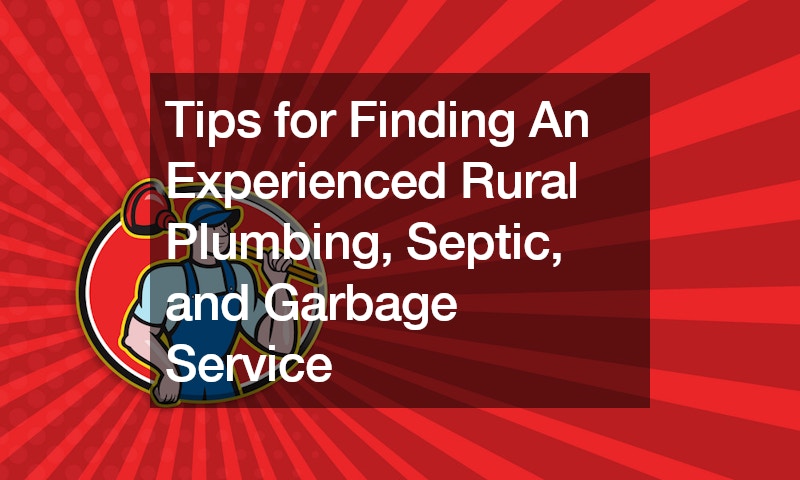
Tips for Finding An Experienced Rural Plumbing, Septic, and Garbage Service
Living in the countryside offers tranquility and connection to nature, unmatched by urban environments. However, it also comes with its unique challenges, especially when maintaining your homestead’s basic utilities like plumbing, septic systems, and garbage disposal. Unlike in the city, rural areas might not have immediate access to such essential services, requiring homeowners to be more proactive and informed in finding skilled professionals.
This becomes even more critical for services like rural garbage service, where professional handling and proper disposal are key to preserving rural areas’ natural beauty and environmental health. In this blog, we’ll guide you through essential tips for finding experienced and reliable providers for your plumbing, septic, and rural garbage services – ensuring your rural haven remains a sanctuary without the hassle.

Understand Your Needs
Before you begin your search for service providers, it’s crucial to have a clear understanding of your specific needs. Rural properties can have unique setups, from traditional septic systems to more modern eco-friendly solutions, and the type of waste management systems in place can vary greatly.
Knowing the details of your plumbing, septic system, and garbage disposal requirements will help you communicate more effectively with potential service providers and gauge their expertise in handling similar situations. For instance, if you have a cesspool as part of your septic system, finding a service with expertise in local cesspool pumping is essential.
This specific service requires a deep understanding of the local soil composition, environmental regulations, and the technical know-how to perform the pumping safely and efficiently. It’s not just about removing the waste; it’s about doing so in a way that ensures the longevity of your cesspool and the health of your surrounding land.
Local Recommendations
Seeking local recommendations is another vital step in finding suitable plumbing, septic, and garbage services in rural areas. The firsthand experience of fellow community members can provide invaluable insights into the reliability, efficiency, and quality of services offered by local providers.
Connect with neighbors, local businesses, and community forums to gather recommendations. This networking helps find tested and trusted services and understand the local landscape of service availability and satisfaction levels.
When inquiring about rural garbage service specifically, highlight the nature of your requirements to ensure the recommended service aligns with your environmental and disposal needs. This might include regular garbage pickup, recycling options, and any special waste disposal needs unique to rural living.
Since garbage service in rural areas can sometimes be less frequent or comprehensive than in urban centers, understanding the specifics of what each company offers, their pickup schedules and their approach to recycling and environmental protection is crucial. Engaging with local communities about these services ensures you find a provider that respects both your needs and the rural environment.
Qualifications and Licensing
When evaluating potential service providers for rural garbage service, plumbing, or septic needs, verifying their qualifications and licensing is necessary. This is not just about ensuring that they have the technical skills for the job but also about confirming their compliance with local regulations and standards. Many regions require service providers to hold specific licenses and certifications, affirming their expertise and commitment to adhering to environmental and safety standards.
Doing your due diligence in this area involves asking providers for their licensing information and possibly checking with local authorities or relevant professional boards to verify their standing. This is particularly important for plumbing and septic system maintenance services, where improper handling can lead to significant environmental and health risks. A licensed plumber or septic service technician will have the necessary training and knowledge to address these challenges effectively and safely.
Additionally, inquire about any continued education or professional development the service provider engages in. Fields like waste management and plumbing are constantly evolving. New technologies and methods are being developed to increase efficiency and reduce environmental impact. A provider who invests in learning about these advances is likely to offer higher quality and more sustainable solutions.

Experience in Rural Services
The experience a service provider brings to the table, especially when it comes to rural garbage service, plumbing, or septic systems, cannot be overstated. Working in rural settings presents a unique set of challenges not found in urban environments — from navigating geographical remoteness to understanding the intricacies of local ecosystems. A provider with a solid track record in rural services is likely to possess the practical knowledge and problem-solving skills needed to manage these challenges effectively.
For instance, a seasoned rural garbage service provider would be adept at regular waste collection and handling specific rural needs, such as the disposal of agricultural waste or the safe removal of hazardous materials found in some homesteads. They would also be familiar with local regulations governing waste disposal and be able to offer advice on how to minimize environmental impact, perhaps suggesting the use of mulch for organic waste as a way to recycle nutrients back into the garden.
Mulch, in particular, serves a dual purpose in rural waste management. Not only does it help in reducing the volume of organic waste that needs to be collected, but it also plays a critical role in soil conservation and moisture retention. A knowledgeable garbage service provider might provide mulching services or advice on how to effectively mulch your organic waste, enhancing the sustainability of your property and contributing to the overall health of your local ecosystem.
Environmental Compliance
Ensuring environmental compliance is a pivotal aspect of selecting a rural garbage service, plumbing, or septic system provider. Local and national regulations often govern the disposal of waste, the maintenance of septic systems, and the installation and operation of plumbing, including sump pumps, to protect the environment and public health. Compliance with these regulations not only safeguards the natural beauty and integrity of rural areas but also prevents potential legal issues that can arise from non-compliance.
When discussing environmental compliance, it’s essential to inquire about how a service provider handles various types of waste, especially hazardous materials, and their approach to the conservation of local water sources and soil quality. For instance, properly managing and disposing of chemicals or farm waste are critical in preventing soil and water contamination.
Additionally, for homeowners with basements or areas prone to flooding, ensuring that a sump pump is properly installed and maintained is crucial to prevent water damage and mold growth, which can severely impact health and property.
In this context, a rural garbage service and a sump pump service highlight specific areas of concern for rural residents seeking to maintain their homestead while adhering to environmental standards. A reliable rural garbage service is instrumental in managing daily and specialized waste efficiently, thereby minimizing its impact on the local ecosystem.
Similarly, a robust sump pump system plays a vital role in managing water levels, protecting home integrity, and preserving the land’s natural drainage patterns. Thus, when choosing service providers, their expertise in these areas and their commitment to environmental compliance should be carefully evaluated to ensure they meet the needs of the rural setting and its ecological challenges.

Emergency Services
One critical aspect of choosing a service provider in the countryside involves their availability and responsiveness to emergencies. In rural areas, where the nearest help could be miles away, having a dependable provider who can swiftly manage crises is invaluable. Whether it’s a burst pipe in the dead of winter, a sudden septic tank overflow, or an urgent garbage disposal issue, the ability to quickly call upon a trusted professional can minimize damage and restore normalcy with minimal disruption.
Emergency situations test not only the reliability of a service but also its preparedness and resourcefulness in handling unexpected complications. This underscores the importance of selecting providers who offer round-the-clock emergency services, ensuring that you’re covered no matter what time of day or night an issue arises.
Emergency plumbing services are the backbone of rural home maintenance, addressing sudden leaks, burst pipes, or malfunctioning water heaters that could otherwise escalate into major concerns. A proficient emergency plumber combines speed, efficiency, and expert problem-solving skills to tackle plumbing emergencies, mitigating potential water damage and preserving the home’s plumbing integrity.
Similarly, sewer repair services stand out as critical for maintaining the environmental health and infrastructure of a rural homestead. Issues such as blockages, breaks, or leaks in the sewer system demand immediate attention to prevent contamination and ensure the smooth functioning of waste disposal systems. A service equipped to handle emergency sewer repair scenarios demonstrates an essential blend of technical expertise and environmental stewardship, essential traits for sustaining rural living conditions.
Reviewing Past Work
Reviewing the past work of potential service providers offers a tangible glimpse into their level of expertise and quality of service. This can be particularly insightful for tasks requiring a high degree of skill and experience, such as rural garbage service and the management of compost.
When evaluating a provider’s history, consider asking for case studies or examples of previous projects that are similar to your needs. This can give you a better understanding of how they approach specific challenges associated with rural living, such as ensuring the efficient disposal of waste in a way that minimizes environmental impact.
For services like compost management, which is crucial for recycling organic waste and promoting soil health, examining a service provider’s past work can reveal their commitment to sustainability and eco-friendly practices. It’s important to look for evidence of innovative solutions, such as turning yard waste and kitchen scraps into nutrient-rich compost that benefits garden areas without contributing to landfill overflow.

Cost Estimates and Transparency
Another critical consideration in selecting a rural garbage service or any provider for your rural home’s needs is understanding the costs involved. Transparent and detailed cost estimates are essential for budgeting and avoiding any unexpected expenses down the line. It’s advisable to request comprehensive quotes from multiple service providers, ensuring they include all potential costs, from initial setup or installation fees to regular service charges and emergency call-out fees.
This transparency allows homeowners to make informed decisions based on both the quality of service and the overall cost. It’s particularly important in rural areas, where services may be more limited and potentially more expensive due to the challenges of servicing more remote locations. Thus, a clear analysis of cost against service effectiveness and reliability becomes crucial in determining the best provider for your needs.
When considering rural garbage service, understanding the pricing model — for example, whether it’s based on volume, frequency of pickup, or types of waste collected — can help in forecasting annual waste management costs. Similarly, for services like drain cleaning companies, knowing whether the cost is flat or if it varies based on the complexity of the blockage or the time required for cleaning can prevent potential misunderstandings and ensure that the service fits within your budget.
Communication and Customer Service
Efficient communication and stellar customer service are the cornerstones of any successful service partnership, especially in the realm of rural living, where solutions need to be tailored to specific environmental and logistical challenges. A provider’s willingness to engage, listen, and respond to your concerns demonstrates their commitment to customer satisfaction and ability to adapt their services to meet unique rural needs.
This aspect of service delivery becomes particularly crucial when dealing with complex issues that require a nuanced understanding of the situation and a collaborative approach to finding solutions. For example, scheduling flexibility, clear communication regarding service times, and responsiveness to emergency calls are pivotal in ensuring your needs are promptly and effectively met.
A service provider exhibiting these qualities is likely to forge a strong and reliable relationship with their clients, enhancing the overall service experience. This level of engagement is vital in managing and executing specialized tasks, such as a tank cleaning service, which requires stringent safety measures, expertise, and the right equipment to ensure it is done correctly and efficiently.
When selecting a tank cleaning service, the provider’s ability to communicate the scope of the work, the methods used, any potential disruptions, and post-service follow-ups should be considered. This transparency ensures that you are fully informed and builds trust between you and the service provider, a key element in a successful long-term service partnership in a rural setting.
Choosing the right service provider for rural garbage service, plumbing, or septic system needs in a rural setting requires careful consideration of several crucial factors. From ensuring that the provider has the necessary experience and commitment to environmental compliance to assessing their responsiveness to emergencies and their communication and customer service skills, each aspect plays a vital role in ensuring that your rural homestead thrives while minimizing its environmental impact. By reviewing a potential service provider’s past work, transparency in cost estimates, and overall customer service approach, homeowners can make informed decisions that contribute to the sustainability and health of their rural environment.

